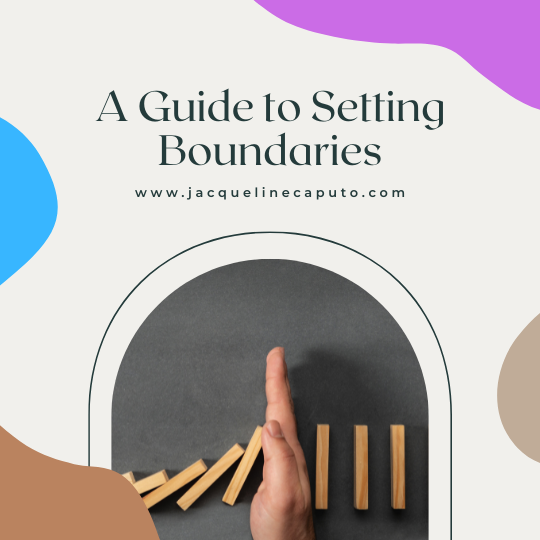Is it hard for you to set and maintain healthy boundaries?
Do you wish to create space between yourself and another person but don’t know how?
Do people make you uncomfortable and refuse to respect your limits?
If you answered “yes” to any of these questions, know you are not alone! It can be challenging to set healthy boundaries with other people. Even when people say things that hurt us, make us feel uncomfortable, or repeatedly go against our wishes, we still fear standing up for ourselves. Doing so can be challenging, especially if you dislike confrontation or voicing your opinion.
Think about the people in your life. Hopefully, most people in your circle make you feel good about yourself, and you are happy when you are with them or speak to them. Unfortunately, there are people we will come across in this world that make us feel small. These people don’t lift us up; they only tear us down. They make us question why we are friends with them or have this energy in our life.
Please remember that no one should ever make you feel this way! You deserve to have people in your life that bring out the sunshine in your soul.
You may be asking yourself, “Why is it so hard for me to instill boundaries in my life?” Even if you really want to, there may be challenges holding you back from doing so. Below are some reasons why you might find it hard to maintain boundaries.
Why it May Be Hard for You to Set and Maintain Healthy Boundaries
People Pleasing Tendencies
Do you consider yourself a people-pleaser? A people-pleaser is someone who finds it very difficult to say no to people or let others down. These people will often take on so much from other people, even when struggling to handle their own lives.
People-pleasers will put what’s best for others before themselves, and this can cause chaos in their lives. If you are a people-pleaser, this can stem from past trauma.
Sometimes when people experience trauma, they go through a fawning response; when these people face abuse, their way of coping is to usually appease the other person and try to calm the situation down. This can often lead to them putting the needs of others first and their boundaries behind.
Caring Too Much About What Other People Think
Many times we just want to fit in and be likable. It can be challenging to stand up for ourselves because we fear being ostracized or unliked. For example, someone may always act in a way you don’t appreciate, but you fear telling them how you feel. You worry:
“What if they don’t like me anymore after I tell them?”
“What if people think I’m difficult or annoying?”
“How can I find a way to say something without making them mad at me?”
Women, especially, may find this hard to do. Society constantly puts pressure on women to do so many things, all while being “palatable” and “likable.” Most of the time, when a man sets a boundary or is more vocal, it is applauded. On the other hand, when a woman acts like this, she is called “nasty,” “mean,” or even worse names.
Low Self-Worth
If you are someone with low self-worth, it can be hard for you to maintain boundaries with others. People with low self-worth find it hard to see the value in themselves. We are all full of infinite value and worth instilled in us.
When you have low self-worth, it is hard for you to see the sparkle you possess. You look down on yourself a lot, speak negatively about who you are, think degrading thoughts, and don’t think you deserve to be treated with respect. This constant low value and self-esteem we place on ourselves can even be signs of depression.
This low self-worth allows you to be around people who not only lower your vibration but might even cross boundaries or make you feel uncomfortable. You deserve to have people in your life who respect you always! Other people should always honor your limits and never do something intentionally to make you uncomfortable.
Not Being Listened To
Unfortunately, there are many cases where parents don’t value the child’s voice. When children express themselves, some parents still force them to do certain things, don’t listen to their concerns, or disregard their feelings completely. This lack of being heard can also continue with other relationships.
Think of a toxic friend you had. This friend may have always done things that made you uncomfortable and hurt you. You may also have been in an unhealthy relationship with someone, and they constantly disregarded your feelings and emotions.
When facing people who continuously go against our boundaries, it can be hard to think that anyone will ever respect them. We think to ourselves, “Why should I even try to set up a boundary when I know this person will never follow it?”
How to Set Healthy Boundaries
You first need to care for yourself and respect your boundaries. You, just as much as anyone in this world, should be treated with love and respect. You deserve to have healthy boundaries and honor your comfort level.
If the people in your life make you feel like that is impossible, they do not deserve to access you, your time, or your energy.
Remember, it will probably feel strange or even uncomfortable at first. Even if setting boundaries makes you feel weird, keep practicing. When you do something for the first time, it can feel awkward until you become accustomed to or comfortable doing it.
Stay motivated by the idea that you are genuinely putting yourself first and looking out for your best intentions!
Identify Your Boundaries and Make a Promise
You first need to identify what boundaries you would want in your life. Figure out what you need in a relationship and what you don’t want. Be completely honest with yourself throughout this process.
Compile your ideas and look at each bullet point. When you identify your boundaries, make a promise to yourself that you will try to uphold them as best you can. Life has its ups and downs, and there may be times when you get nervous about setting boundaries with certain people. Promise that you will always try your best to get back to a place where you are enforcing what is best for you.
Use Your Voice and Stand Firm
“I’ll have to get back to you after I think about it.”
“I don’t have any more emotional bandwidth for this conversation.”
“I cannot help you today – maybe some other time!”
These are phrases that help put yourself and your needs first! Using “I” statements bring power to your declarations – you are owning your voice and limits! You also need to realize that “no” is not a dirty word.
Although it can be difficult, saying “no” to someone is always an option. Know that the word “no” is always good enough; it does not need to be followed by any excuse.
For example, if you don’t want to go to an event, it is okay to say no. Often, especially if you are a people-pleaser, you feel obligated to give elaborate excuses for why you cannot accommodate someone else.
Ultimately, when you learn to say “no” and stick to your choice, you will feel more confident when saying these words.
Take Time to Rehearse
If you feel nervous, that’s okay! Talking with a trusted friend and practicing what to say can help you gain confidence in implementing boundaries. Have your friend pretend to be someone who is unhappy about the boundary you are setting. Brainstorm ways to stand up for yourself and approach this type of situation. This exercise can help you feel extra prepared.
If you feel shy about doing this with a friend, try practicing what you will say in a mirror or to yourself when you are alone. Listen to your voice and get used to saying these phrases out loud.
Cultivate Self-Worth
As mentioned before, your self-worth plays a significant factor in how you maintain boundaries. If you don’t think you are worthy of being treated with respect, it can be hard for you to stand up when people disregard your feelings, emotions, or limits. You deserve to be respected, always!
Ways to Improve Self-Worth
- Encourage yourself with positive affirmations, quotes, and phrases
- Go against negative self-talk and fight against negative thoughts in your brain
- Get inspiration from other people through motivational videos, books, media, TV shows, TED Talks, etc.
- Only allow people who make you feel good about yourself in your inner circle – purge yourself of toxic people and their effect on you
- Wear clothes that make you feel confident, and you feel comfortable in
- Practice self-care and take time to pamper yourself
Reconsider Some Relationships in Your Life
Sometimes, no matter how hard you try, people won’t respect your boundaries. For example, you may talk to your aunt and express that you don’t like when she pries into your romantic relationships. Even though you’ve mentioned this numerous times, she continues to ask invasive and uncomfortable questions.
Realize that it is okay not to discuss specific topics with other people. If she refuses to respect your limits, think about telling your aunt you will no longer have conversations involving these topics unless your boundaries are met.
Also, know that you don’t need people in your life who refuse to respect you; mutual respect should be one of the pillars of a relationship. If you have a friend who constantly makes you feel bad about yourself and disregards your boundaries, you are allowed to reconsider even having them in your life.
Go to Therapy
Going to therapy can help you set boundaries with people. A therapist can also assist you with all the different types of issues you face in your life. If you think you are a people-pleaser or have low self-worth, therapy can help give you the tools to put yourself first, believe in yourself more, and start to honor your voice/time.
Treatment can be beneficial for people with trauma, as well. Receiving therapy for trauma can help you start a journey of healing. As mentioned in another one of my prior articles:
Cognitive Behavior Therapy (CBT) can help you deal with your trauma and find ways to cope. For example, if someone was abused and started fawning, they might be people-pleasers. A therapist can help this person break away from their people-pleasing ways and set healthy boundaries with others. Eye Movement Desensitization and Reprocessing (EMDR) can also help people who have been through trauma.
Overall, Remember to…
Be kind and patient with yourself! Changing patterns takes time, and you should be proud of any progress you make. Setting boundaries is an act of self-love; it helps you prioritize your needs! You deserve to show this care and consideration to yourself.

About the Author
Jackie Caputo is a Licensed Marriage and Family Therapist who provides therapy in Woodland Hills, CA. She also provides online therapy in California to individuals throughout the state.

